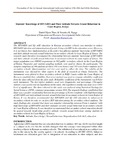Students’ Knowledge of HIV/AIDS and Their Attitude Towards Sexual Behaviour in Coast Region, Kenya
Abstract
The HIV/AIDS and life skill education in Kenyan secondary schools was intended to reduce
HIV/AIDS infection and stigmatisation of people living with HIV in the education sector. However,
it is not known how implementation of the policy has affected students’ knowledge of HIV/AIDS
and their attitude towards sexual behaviour in secondary schools in Coast Region of Kenya. The
research study therefore investigated the relationship between students’ knowledge of HIV/AIDS
and their attitude towards sexual behaviour in secondary schools in coast region of Kenya. The
target population was 108693 respondents in 362 public secondary schools in the Coast Region
of Kenya. Purposive and random sampling methods were used to choose the participants. The
samples comprised of 388 students of which 193 were Form 1 and 195 were Form 4 students in 13
secondary schools. Questionnaires and test were used to collect the data. The validity of the
instruments was checked by other experts in the field of research at Chuka University. The
instruments were piloted in three secondary schools in Kilifi County within the Coast Region of
Kenya to establish their reliability. Test-retest method was used to compute reliability coefficient
from the data collected from the pilot study. Reliability coefficient of the instruments was 0.8 for
each instrument. The descriptive statistics used were frequencies and percentage. Chi-squire
statistics was used to test the hypotheses in the study. The hypotheses testing was done at α = 0.05
level of significance. The data collected in this study was analysed using Statistical Package for
Social Sciences (SPSS) computer programme version 20.0. The research findings established that
there was a positive relationship between the percentage of Form 1 students’ with high knowledge
of HIV/AIDS and their attitude towards sexual behaviour in secondary schools in Coast Region of
Kenya. It was therefore recommended that HIV/AIDS and life skill education be enhanced in
secondary schools in order to cut down HIV infection among the secondary school students. The
study findings also revealed that there was negative relationship between Form 4 students’ with
high knowledge of HIV/AIDS and their attitudes towards sexual behaviour in secondary schools
in Coast Region of Kenya. It was therefore recommended that secondary school education should
be geared towards inculcating positive attitude towards sexual behaviour among students in
secondary schools in Coast Region of Kenya.
Key Words: Attitude, Knowledge’, Sexual behaviour, Stigmatization, Life skill, education

